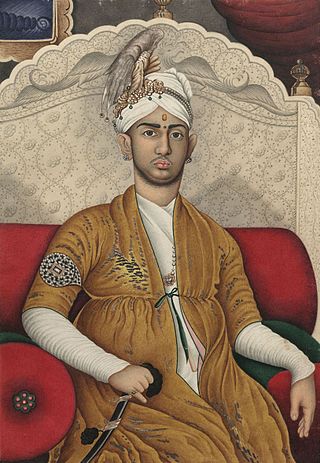
Sri Swathi Thirunal Rama Varma III was the Maharaja of the Kingdom of Travancore. He was a great musician and composer who has to his credit over 400 classical compositions in both Carnatic and Hindustani style.
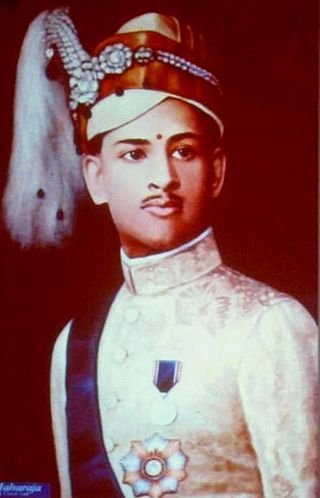
Sree Padmanabhadasa Sree Chithira Thirunal Balarama Varma, popularly known as Sree Chithira Thirunal, was the last ruling Maharaja of the Indian princely state of Travancore, in southern India until 1949 and later the Titular Maharajah of Travancore until 1991. His reign is known for several notable reforms that have indelible impact on the society and culture of Kerala.

Raja Ravi Varma was an Indian painter and artist. His works are one of the best examples of the fusion of European academic art with a purely Indian sensibility and iconography. Especially, he was notable for making affordable lithographs of his paintings available to the public, which greatly enhanced his reach and influence as a painter and public figure. His lithographs increased the involvement of common people with fine arts and defined artistic tastes among the common people. Furthermore, his religious depictions of Hindu deities and works from Indian epic poetry and Puranas have received profound acclaim. He was part of the royal family of erstwhile Parappanad, Malappuram district.
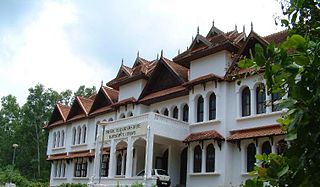
The Oriental Research Institute & Manuscripts Library, University of Kerala, is one of the leading centres of Indology in India. It is located at Kariavattom, Thiruvananthapuram, Kerala. The institute carry out researches on Indian language manuscripts, about 80% of which are in Sanskrit. The department is microfilming the manuscripts of certain technical subjects.
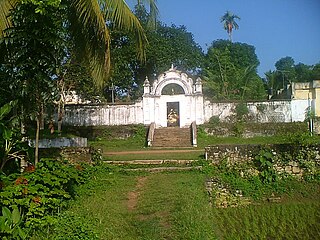
Kilimanoor Palace is a palace located in Kilimanoor, in the Indian state of Kerala. It is the birthplace of painter Raja Ravi Varma and Raghava Varma, the father of king Marthanda Varma.

The city of Thiruvananthapuram has been the centre of cultural activities of Kerala (India) from the time it was made capital of Travancore in 1745. The capital city is a major intellectual and artistic center. The Thiruvananthapuram Museum and Thiruvananthapuram Zoo were started during the reign of Swathi Thirunal (1813–1847) and are one of the oldest of their kind in India. The city's libraries include the Trivandrum Public library, which was started in 1829. The Swathi Thirunal College of Music and 'College of fine arts' are the leading institutions related to music and arts.
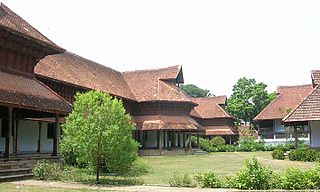
Kuthiramalika is a palace built by Swathi Thirunal Rama Varma on the south-eastern side of Padmanabhaswamy temple, Thiruvananthapuram.

Shrenik Rao is an Indian film-maker, academic, and broadcaster. He is the founder and chief executive of Dolsun Media (2005) and 7MB – 7 Media Broadcasting Pvt Ltd (2010). He was a Fellow at the University of Oxford’s Reuters Institute for the Study of Journalism (2016) & an alumnus of the London School of Economics.
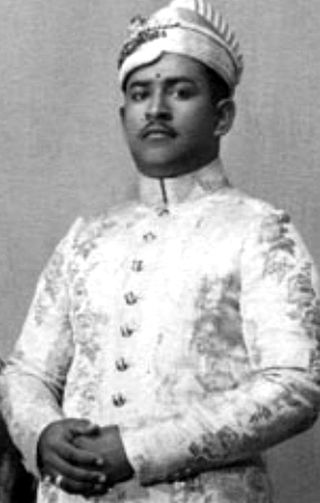
Sree Padmanabhadasa Sree Uthradom Thirunal Marthanda Varma was the titular Maharaja of Travancore. He was the younger brother of the last ruling monarch of the Kingdom of Travancore, Maharajah Chithira Thirunal Balarama Varma.

Swathi Sangeethotsavam is a ten-day festival of music celebrating the compositions of Maharaja Swathi Thirunal. The festival is held from 4 to 13 January every year at Kuthira Malika, Trivandrum, where the Maharaja is believed to have composed many of his works. The festival is a tribute to Swathi Tirunal and is exclusively dedicated to his compositions. The concerts are not ticketed. The festival is conducted by Rama Varma Maharaja of Travancore Trust under the helm of Prince Rama Varma.

Aswathi Thirunal Rama Varma, known colloquially as Prince Rama Varma, is an Indian classical musician and a member of the erstwhile Royal Family of Travancore. He is a Carnatic vocalist as well as an exponent of the Saraswati Veena. He is also recognized as a music teacher, musicologist, writer and orator. He has performed at concerts and conducted music workshops all over India and in several other countries including United States, UK, Netherlands, France, UAE, Malaysia and Singapore. YouTube videos of his concerts, classes and lecture-demonstrations are popular among music lovers, music students and professional musicians alike, and have exceeded 20 million views as of July 2022.

The Travancore royal family was the ruling house of the Kingdom of Travancore.The Travancore royal family signed a treaty with the British in 1788, thereby adopting British dominance. Later, in 1805, they revised the treaty, leading to a diminution of royal authority and the loss of political independence for Travancore. They had to give up their ruling rights over the common people in 1949 when Travancore were forced to merge with Independent India and their political pension privileges were abolished in 1971.

Swathi Thirunal College of Music is a music college in Thiruvananthapuram, Kerala, India. It was founded in 1939. It was first named as "The Music Academy". The name was renamed as Swathi Thirunal College of Music in 1962. The founder of this institution was the last reigning King of Travancore, Sree Chithira Thirunal Balarama Varma in 1939. The administration of the institution was under the control of the Travancore royal family earlier. Eminent musicians like Muthiah Bhagavatar who was the first Principal, Semmangudi Srinivasa Iyer, etc. have served as Principals of this college.
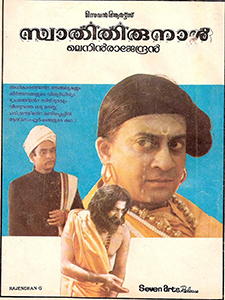
Swathi Thirunal is a 1987 Indian Malayalam-language biographical film co-written and directed by Lenin Rajendran. The film is based on the life of Swathi Thirunal Rama Varma, the Maharaja of Travancore. It stars Anant Nag in the title role, with Srividya, Nedumudi Venu and Murali in other important roles. The cinematographer was Madhu Ambat.
K. S. Narayanaswamy, was a Carnatic veena exponent of the Thanjavur style, in which nuances and subtleties are given more importance over rhythm based acrobatics. He was awarded the Madras Music Academy's Sangeetha Kalanidhi in 1979.
Parappanad was a former feudal city-state in Malabar, India. The headquarters of Parappanad Royal family was at the town Parappanangadi in present-day Malappuram district. In 1425, the country divided into Northern Parappanad and Southern Parappanad. Southern Parappanad included parts of Tirurangadi Taluk and the town Parappanangadi. Northern Parappanad included Panniyankara, Beypore, and Cheruvannur of Kozhikkode Taluk. Parappanad royal family is a cousin dynasty of the Travancore royal family.
Thirunal is a surname. Notable people with the surname include:

Sree Padmanabhadasa Sree Moolam Thirunal Rama Varma is the current incumbent to the throne of Travancore. He is the youngest of the four children of the former titular Maharani of Travancore, Sree Padmanabhasevini Maharani Karthika Thirunal Lakshmi Bayi and her husband, Prince Consort Lt. Col. G. V. Raja of Poonjar Royal House.

Moolam Thirunal Sethu Parvathi Bayi (1896–1983), better known as Amma Maharani, was the Junior Maharani (Queen) of Travancore as well as a promoter of Indian Classical music. She was the mother of Chithira Thirunal Balarama Varma, the last King of Travancore. She was the president of the National Council of Women in India in 1938–1944.
















